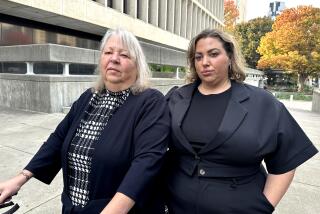D.A., Hospital Using Same Attorney
- Share via
Dist. Atty. Michael D. Bradbury has hired the same high-powered Sacramento attorney retained by Community Memorial Hospital to counter a recent grand jury report questioning the legality of a local ordinance that funnels millions of dollars in sales tax revenue every year to public safety budgets.
Attorney Steve Merksamer, chief of staff to former Gov. George Deukmejian, was hired by the district attorney to help draft a response to the Ventura County Grand Jury’s report, Chief Assistant Dist. Atty. Greg Totten said. The citizens panel urged the Board of Supervisors to rescind the county ordinance that directs as much as $40 million in annual sales tax revenue to four public safety agencies.
Merksamer’s Mill Valley law firm, which specializes in initiative law, worked on drafting a public safety initiative for the district attorney and sheriff five years ago, Totten said. The initiative was ultimately adopted by supervisors as an ordinance.
So it was only logical for the district attorney to seek Merksamer’s legal expertise in defending the ordinance, Totten said. Merksamer’s fees for the service are capped at $20,000, with the money coming from the district attorney’s budget, Totten said.
“They couldn’t be represented by [county counsel] Jim McBride, obviously,” said Merksamer. “My guess is both of them decided to hire us for the same reason. . . . We’ve handled 150 or 160 of these cases over the years.”
Totten said that Merksamer offered an advantage in this case because he is familiar with the public safety ordinance, and could do the work quickly. If the battle over public safety funds heated up and litigation became necessary, the district attorney would likely choose to seek legal help from within the county, Totten said.
Merksamer pointed out that both county counsel and the county clerk have hired private attorneys to deal with issues relating to Community Memorial Hospital’s efforts to strip the county of $260 million in tobacco settlement money. The county and Community Memorial recently sued each other over the nonprofit hospital’s proposed November ballot initiative that seeks to turn the money over to private hospitals.
In its response to the grand jury report, Bradbury’s office cited some identical case law used by Community Memorial in its lawsuit hoping to force county supervisors to place the measure on the ballot. In some cases, sections in the hospital’s lawsuit filed Tuesday appeared verbatim in the district attorney’s statement of last week.
Both documents make essentially the same argument concerning county revenues: Voters, not the Board of Supervisors, have the right to say how county government spends its dollars.
Bradbury has been a member of the Community Memorial Hospital board since 1996. But he has not taken a position on the battle between Community Memorial and the county for control of the tobacco money.
Chief Administrative Officer Harry Hufford said that the two documents that Merksamer worked on are clearly linked from a policy standpoint, and the potential success of one would strengthen the argument of the other. That could either be a boon to the initiative process, which Hufford has characterized as a potential grab for money by special interests, or a shot in the arm for the county.
If the Community Memorial initiative passes through the court, it helps the district attorney’s stance on the public safety ordinance. “If it’s invalidated, it weakens” the ordinance, Hufford said.
Merksamer did not disagree with Hufford’s assessment and said that both cases are about Californians’ “right to initiative and referendum.”
“It’s one of our most precious rights,” he said. “At the end of the day, legislators and boards of supervisors only exercise the power of the people.”
At its worst, Hufford said, if the county is unable to block Community Memorial’s initiative or get some wiggle room in its funding of public safety, local governments could be at the mercy of competing special interests.
“The issue is local self-government and the ability to control your own destiny,” Hufford said. “Any large interest group could trigger the same kind of proposal.”
More to Read
Sign up for Essential California
The most important California stories and recommendations in your inbox every morning.
You may occasionally receive promotional content from the Los Angeles Times.













